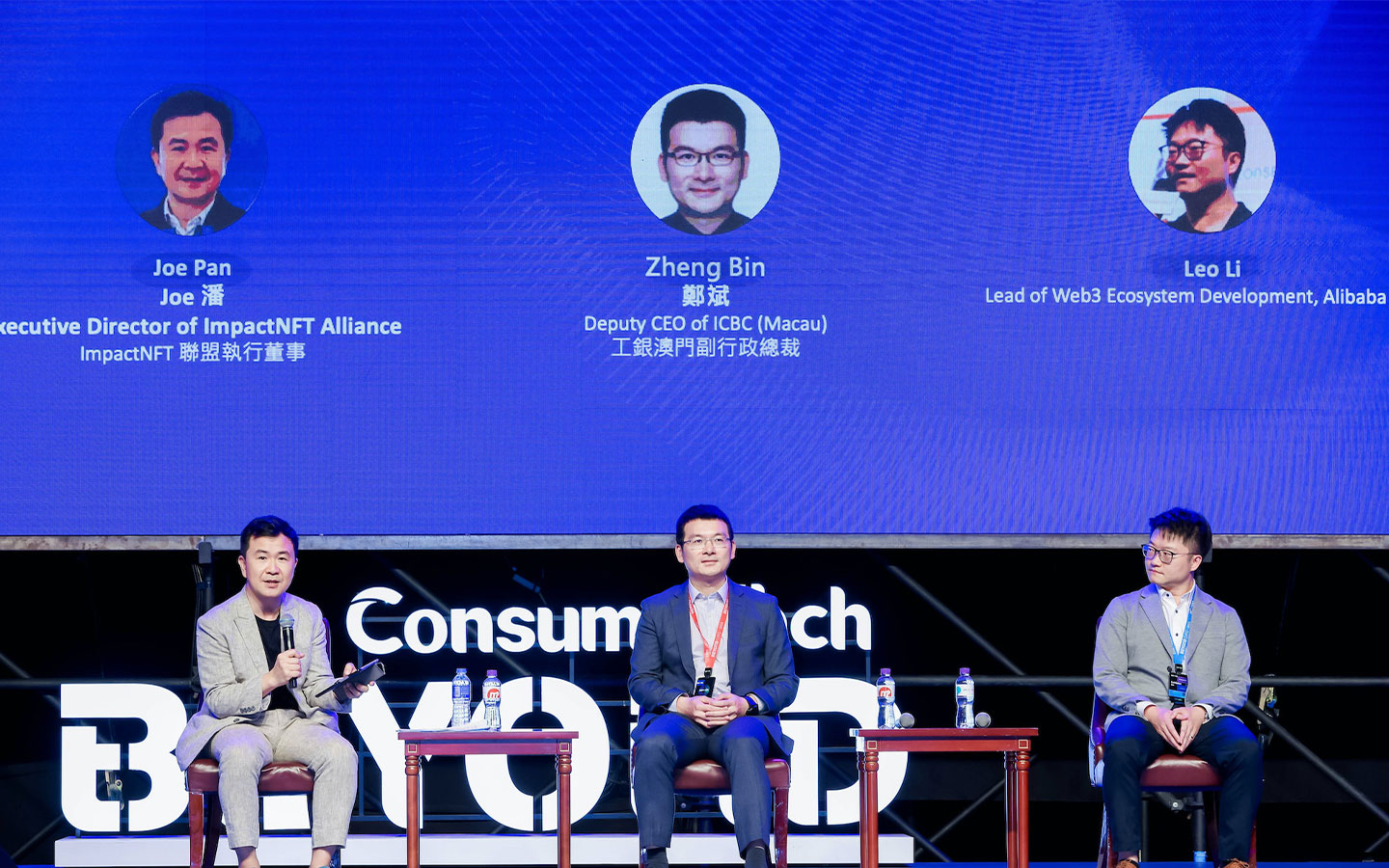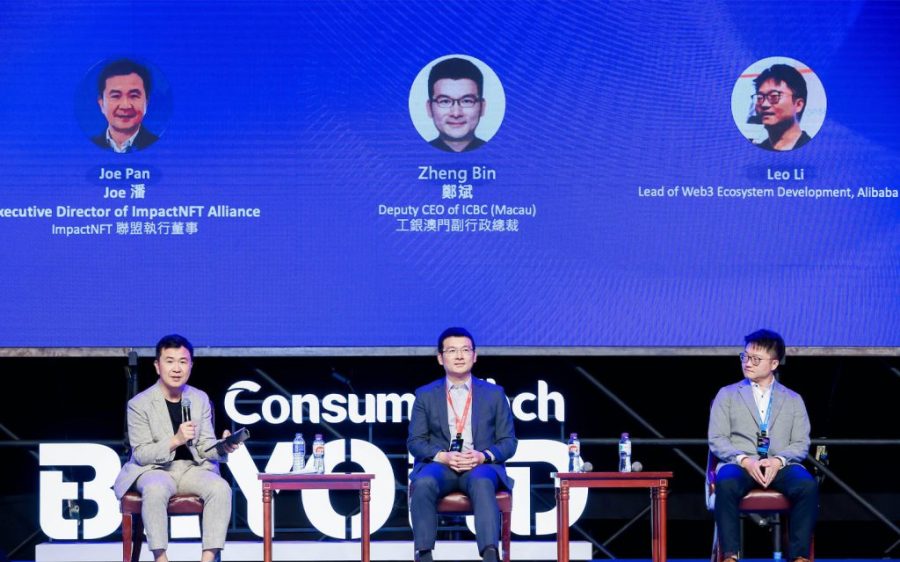The consumer technology summit at the BEYOND International Technology and Innovation Expo 2023 got underway on Wednesday afternoon at the Venetian Macao.
The three-day event features hundreds of speakers, panellists and exhibitors covering three core conclaves, or “summits”: healthcare, sustainability and consumer tech.
Each summit features a packed schedule of panel discussions and product displays exploring the intersection of technology with our lives.
At the consumer technology summit, several global game-changers are leading talks on topics ranging from unmanned vehicles and Web3 to generative AI’s impact on the retail and consumer industries.
Web3 is a new, decentralised iteration of the Internet powered by blockchain technology and token economics.
Day one began with a keynote address on “The Web3 in the New AI Era” by Prof. Yang Wang, vice-president for institutional advancement at the Hong Kong University of Science and Technology.
[See more: 5G has finally launched in Macao. What will it mean for the city?]
“Hong Kong [and China] has made it known to the world: we want to develop the digital economy, we want to develop Web3. There is a very strong commitment to this”, the professor said.
Wang added that the emergence of AI-powered creative tools such as ChatGPT, Midjourney and Stable Diffusion have “offered a watershed moment for the true emergence of Web3” by allowing more people to generate content – and own the content they create.
“The technology has enabled numerous tasks that were otherwise inaccessible to even the most highly educated people”, he said.
He capped his speech with a note of optimism, explaining that China’s open embrace of technology signalled ample opportunities to capitalise on Web3.
The future of the web
His speech was followed by a “fireside chat” between Junbo Zhang, the CEO of Unity China, and Liu Yukun, editor-in-chief of Phoenix Technology.
“Will [AI and Web3] technology lead to revolutionary change?” Yukun asked, setting the tone for a discussion that centred on the disruptions occurring in the web development and programming world.
“I think we’ll see very substantial changes in the next three to five years,” Zhang replied, emphasising that disruption is not necessarily a negative.
“Everyone assumes that if code is automatically generated, we won’t need so many programmers in the future. But AI technology is a tool that helps developers unleash their creativity to a greater extent, and other developers will only benefit [as the industry evolves].”
Similar themes were taken up in a panel discussion on “Investing in Web3”, moderated by Zhang Lijuan, technology editor-in-chief of Chinaventure. The panellists were Xu Chen, a partner at CMC Capital; Ma Ning, a founding partner of LingFeng Capital; and Rex Zheng, the managing director of UpHonest Capital.
“Now is a very good time to invest [in Web3-driven companies],” said Ning.
He explained that he remained bullish despite recent dips in the global market because companies in China, especially those working in data, are primed to grow exponentially.
“When others are pessimistic, it’s better to be active,” he said.
Chen echoed the sentiment.
“China has an inherent advantage in its internet ecology,” he said, pointing to its “huge number of internet users” and “growing demand for Web3 products driven by our really outstanding, [internet-savvy] young people. As the technology matures, the opportunities are great.”
[See more: How will Macao power its ‘smart city’ aspirations?]
Subsequent discussions touched on crypto finance and the connections between Web3, blockchain and the traditional economy.
In a discussion moderated by Joe Pan, executive director of ImpactNFT Alliance, Leo Li, the lead of Web3 ecosystem development for Alibaba Cloud, and Zheng Bin, the deputy CEO of ICBC (Macau), touched on one of the hottest topics in recent years: the risks and rewards of cryptocurrency and financial technology.
Although ICBC is a traditional bank, Bin explained that his institution has always invested in emerging science and technology. “Blockchain,” he was quick to point out, “can solve many problems for our clients and customers [by making banking more efficient].”
Li likewise said that investment in financial technology is almost a must for businesses such as Alibaba.
“Web3 is a top priority for us this year; it’s an inevitable trend,” he said.
Both agreed, however, that cryptocurrency and other financial technologies need some form of regulation to boost confidence in them.
“It’s inclusive technology, but in the absence of supervision and a compliance framework, human greed took over, [leading to last year’s crash],” said Li.
The discussion wrapped up with both saying that sandboxes, which allow governments to test cryptocurrency regulations, could provide such a solution and encourage financial institutions to adopt it.
The evolution of digital art
The day concluded with a panel on the value of digital content. Taking part were Rodney Tsang, co-founder of Hammer Capital Group; John Sun, the chairman and CEO of Macau Pass; Jack Q. Gao, the founding partner and CEO of Beijing TDFT; Yinmeng Liu, the founder and CEO of OUTPUT; and Chai Geyang, who is the founder of Tagging and co-chairman of the Hong Kong Blockchain Association.
Central to the disruption of digital content today is the emergence of AI-generated art and non-fungible tokens, or NFTs.
All four delegates expressed a mix of excitement and trepidation at the rapid evolution of digital art.
“The shock [and] the whole change to the industry has been unprecedented,” said Gao.
But, similar to cryptocurrency, better regulation can provide guideposts so that individuals can safeguard their work and reap the rewards their creations yield.
“The technologies are revolutionary and a clear trend driving future development,” said Sun. “But it will be impossible to benefit from them without governance.”
The mission of BEYOND Expo 2023 is to “encourage exchanges of ideas” and “promote comprehensive industrial upgrading, development, and transformation, for a better global innovation ecology”.
The event is being held from 10-12 May at the Venetian Macao Convention and Exhibition Centre.
—With reporting by Craig Sauers
Macao News is an official Macao media partner of BEYOND Expo 2023.






